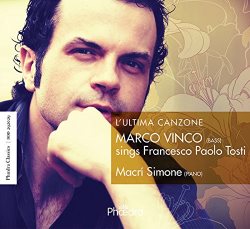|

|
Francesco Paolo TOSTI (1846 – 1916)
L’ultima canzone
see end of review for track listing
Marco Vinco (bass), Macri Simone (piano)
rec. 20–22 December 2012, Kapel van Rosario, Bever, Belgium
Sung texts with English translations enclosed
PHAEDRA 292029 [57:13]
Francesco Paolo Tosti was a multi-talented musician who entered the Naples Conservatory at the age of twelve. There he studied the violin but was also a splendid singer and wrote a large quantity of songs with piano accompaniment. He happened to become singing teacher for Princess Margherita of Savoy and in very little time was so well-known that he decided to move to England. Having made the move he became singing teacher to the Royal Family and also professor at the Royal Academy of Music. In 1908 he was knighted by King Edward VII.
Tosti's songs have survived and today belong to the standard repertoire for, primarily, opera singers – in particular tenors. Numerous recordings have been made since the beginning of the previous century and the great tenors have all excelled in them: Caruso, Schipa, Gigli, Björling, Di Stefano, Domingo, Pavarotti to name a few. Often, during the LP and CD eras, Tosti songs have appeared in mixed programmes but browsing through my shelves I found just two all-Tosti records. José Carreras made a Philips album somewhere around 1980 and Carlo Bergonzi set down a collection on the Orfeo label at about the same time. I also remember an LP — which I never bought, but had some excerpts from it on an Erato sampler — with Ruggiero Raimondi. A search on Amazon resulted in quite a long list of Tosti issues, including a 4-CD-box on Italian Bongiovanni with what seems to be his complete output. Other singers include Renato Bruson, Ben Heppner, sopranos Gillian Zammit and Donata D’Annunzio Lombardi, tenors Ernesto Palacio, Marc Filograsso, Antonino Siragusa, William Matteuzzi, Melvyn Poll and Fausto Chiappinelli. I also found a disc shared by Nuccia Focile and Leo Nucci. Chiappinelli, of whom I know nothing. They obviously recorded the disc to celebrate Tosti’s 145th birthday and thus must have been issued in 1991. In other words, there is keen competition, even though several of the above singers are not exactly household names.
Marco Vinco, today one of the most sought after bass singers on the international circuit, is now in his late thirties. He studied law in parallel with taking singing lessons from legendary Ivo Vinco who was his uncle. Ivo Vinco died in June 2014 aged 86. In the 1980s my wife and I and my sister-in-law used to stay at a hotel in the little village Garda on Lake Garda north of Verona in Italy; the hotel was owned by Ivo Vinco and his wife Fiorenza Cossotto. I remember hearing him at the Arena in 1989 as Ramfis in Aida — his debut role more than 35 years earlier — still in fine vocal shape when he was well past sixty. His nephew’s voice is lighter in texture and smoother – a true basso cantante with excellent diction and musical phrasing. The opening song, Malia, is a superb calling-card and what follows is ample proof that here is not a great voice but an intelligent mind is certainly in evidence and an artist with taste. Ideale, possibly the best known of Tosti’s songs, has been maltreated hundreds of times by beefy dramatic tenors who try to blow out the windows of the recital hall. Marco Vinco sings it with warmth and inwardness, without histrionics, just a flow of effortless nuanced tones. It is a pleasure to hear this beautiful song performed this way. Tosti would have been pleased.
This care over nuance is what characterizes the whole programme: beauty of tone, nothing spectacular but it all sounds right. Listen to Sogno (tr. 7) for instance. He also has a powerfully dark low register but is at his very best when he caresses the beautiful melody – without loss of bass-quality. In Tormento (tr. 8) he expresses the pain of the loss of love – again without histrionics. L’alba separa dalla luce l’ombra (tr. 9), first launched by Caruso and later a Björling favourite, is one of the composer's masterpieces. It is nice to hear it sung for once by a darker voice.
A’vucchella (tr. 10) is a lovely enamoured song and Ninna nanna (tr. 11) is sung for the lullaby it is – soft and caring with the accompaniment gently scintillating. Both songs are with lyrics by Gabriele D’Annunzio.
La mia canzone (tr. 12) is brilliant and in La serenata (tr. 13) we meet the opera singer – but also a sensitive lyricist. Il pescatore canta (tr. 15) reveals his black profundo notes, vital height and a fairly elegant trill. L’ultima canzone (tr. 17) is gloriously sung and the pianissimo end of Vorrei morire (tr. 18) is a worthy finale to this excellent disc.
The recording is good and we get the texts and also English translations, which however are not placed side by side with the originals but below each song. Somewhat inconvenient. The final verdict is: a fresh, musical and wonderfully sensitive and nuanced recital of truly lovely songs.
Göran Forsling
Track listing
1. Malia [2:26]
2. Ideale [2:37]
3. Non t’amo più [4:47]
4. O dolce meraviglia [2:56]
5. Tristezza [3:22]
6. Se tu non torni [2:59]
7. Sogno [2:53]
8. Tormento [3:22]
9. L’alba separa dalla luce l’ombra [2:54]
10. A’ vucchella [2:05]
11. Ninna nanna [3:14]
12. La mia canzone [3:02]
13. La serenata [3:03]
14. Donna, vorrei morir [1:40]
15. Il pescatore canta! [3:53]
16. Baciami [2:55]
17. L’ultima canzone [4:24]
18. Vorrei morire [3:57]
 |
 |
|



 All Nimbus reviews
All Nimbus reviews








